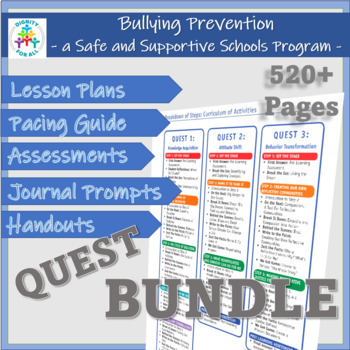Dignity For All: Bullying Prevention - a Safe and Supportive Schools book series
- Zip
Description
Dignity for All: A Safe and Supportive Schools Program
A Whole School Approach to Bullying Prevention
Dignity For All (DFA), is a curriculum rooted in recent findings in neurobiology and intended for middle school audiences. The curriculum focuses on giving students and teachers the tools they need to build skills in reflection, empathy, and teamwork in order to create a safe and supportive environment for the entire school community.
This package includes PDFs of the three Instructor Curriculum Guides and the three Student Guide/Workbooks, as well as video files (MP4) used in the lessons including the DFA music video "Standing Together".
· Instructor Curriculum Guides: The guides are used to help you become familiar with the lessons you will be teaching. This no-prep resource provides clear learning targets, Common Core integration suggestions, detailed instructor notes with suggested teacher prompts, next steps and enrichment activities, assessments with answer keys, as well as suggestions for cross-curricular implementation. Feel free to use the lessons in any order or change them to fit your student’s needs.
· Student Guide/Workbooks: Workbooks are aligned with the instructional material and include all relevant activity worksheets, glossaries, prompts for personal learning goals, and journal entries to document their emotions and reflect critically on the topics of the curriculum. Workbooks can be used to implement the program in an offline or online setting.
· Standing Together: Standing Together is a video about a middle school that chooses to stand up for one another, even in the face of challenges. This video will be visited throughout each Quest.
Classes embark on three Quests, each of which has its own guiding principles:
• Quest 1 – Knowledge Acquisition provides background knowledge on what bullying is, elaborates on the different forms it can take, and describes the impact that the physical brain has on emotional decisions. (23 available lessons)
• Quest 2 – Attitude Shift relates that background knowledge to the importance of empathy and reflection, and encourages students to examine their core beliefs, needs, and long-term goals. (12 available lessons)
• Quest 3 – Behavior Transformation inspires students to create classroom value statements, practice skills that support those values, and use restorative inquiry to create a safe and supportive climate. (13 available lessons)
Customizing the Curriculum: We realize that implementing a new program while meeting the diverse needs of students and standards is difficult. One of our goals is to provide you with ideas, plans, and resources to help facilitate the implementation process. All Activity Plans provide Extension Activities to support students at different levels of academic learning. Since the lessons are written for a range of grade levels, each Activity Plan provides suggestions and/or directions to access some additional material needed to meet grade-level standards. The suggestions provided in the teaching guide will demonstrate how these lessons can have a direct connection to the major subject areas (ELA, Math, Science, and Social Studies).
We want kids to feel free to tell their stories and help shape a new generation of kinder, empathetic, and civic-minded children.
“Bullying is unwanted, aggressive behavior among school-aged children that involves a real or perceived power imbalance. The behavior is repeated, or has the potential to be repeated, over time.”
(stopbullying.gov)
According to the National Center for Education Statistics, 20 percent of students in middle school and high school experience bullying nationwide, with nearly 5 million students being victims of bullying each year. According to DoSomething.org, 1 in 5 students experiences bullying in real life, and at least 37% are bullied online. StopBullying.gov notes that approximately 46% of students in middle school and high school who were bullied during the school year notified an adult at school about the bullying. One in four teachers sees nothing wrong with bullying and will only intervene 4% of the time. We need education in every school so that each community member understands what bullying is and how it can be prevented.
Neuroscience and the Trauma-Informed Approach
Abuse, community violence, racial profiling, the pernicious effects of poverty, and many other forms of trauma affect children’s ability to succeed in school and communicate clearly their feelings and thoughts. Many of them are experiencing chronic stress activation, and a recent major epidemiological study demonstrated that adverse childhood experiences (ACEs) such as these underlie many mental health problems including major depressive disorder.
DFA is informed in its entirety by findings from leading trauma specialists and researchers and co-developed by a trauma practitioner and researcher. DFA seeks to address and remediate the toxic stress that youth today are grappling with by incorporating the tenets of Trauma-Informed Care (TIC). The premise of TIC is to take into account past traumas and actively resist re-traumatization.





